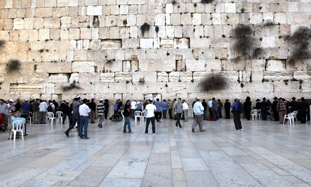By Ben Hartman
The Jerusalem Post
February 18, 2010
http://www.jpost.com/Israel/Article.aspx?id=169089
 |
| Prominent rabbi's fall from grace is an earthquake that could strengthen the national religious community. Photo by Ariel Jerozolimski |
Allegations this week by the rabbinical forum Takana that Rabbi Mordechai “Motti” Elon posed a danger to the public and had sexual contact with male students in the past – and the subsequent decision to open a police investigation – represent a fall from grace for a pillar of religious Zionism, a national leader whose impact was felt far beyond his own community.
It’s hard to overstate the influence Elon had on the religious Zionist community, both as a spiritual leader and an object of widespread admiration. One West Bank rabbi who spoke to The Jerusalem Post Thursday called the affair “a tragedy” and said Elon was not only a “beloved and venerated man,” but also “the closest thing we had to a rebbe in our community.”
Elon headed some of religious Zionism’s most prominent houses of learning, including the Horev and Hakotel yeshivot in Jerusalem. He also hosted a popular weekly TV program on the Shabbat Torah portion and worked to build understanding and cooperation between thereligious and secular communities. He comes from one of the most prominent families in the religious Zionist community: His brother Benny is a former MK and tourism minister, and his father, Menahem, a former Supreme Court Justice.
Throughout this week, Elon has been described by those who know him as the type of leader who saw the Torah as a guiding light in everyday life, not only in the classroom.
If the allegations against him are proven true, it would illustrate how the darkest of human frailties could be possessed and manifested by a source of great pride and moral guidance, a man embodying ideals of piety, morality and selflessness.
But such an event could also, in the end, strengthen a community that has gone through great tribulations over the past decade.
Many of the religious students who idolized Elon first had their hearts broken and their faith in their community’s leadership tested by the withdrawal from the Gaza Strip in 2005. As they took part in the public protest against the Gaza disengagement, they saw the impossible happen: despite everything they had been taught, everything they believed in, Jews did evict Jews in the land of Israel – and the earth did not shudder beneath our feet. In Gush Katif, in 2005, the words and edicts of individual rabbis and visionaries of Jewish liturgy could not defeat the will of the state.
This community has been tested before, and though many rabbis said this week that the Elon affair was no less trivial an event than the Gaza disengagement, the fact remains that the community can weather this controversy.
Unlike some other branches of Orthodox Judaism, modern Orthodox Jews have not been adverse to adaptation. A community that has found ways to fuse religion with modernity and Torah with army service has the ability to deal with the revelation that one of their greatest has fallen. Thereligious Zionist community has always answered setbacks with action, seeking redemption in renewal.
The downfall of such a respected rabbi could also lead to a healthier view of moral and religious leaders in the community. If found guilty of the accusations, Elon could illustrate to countless yeshiva students that every great man is still, in the end, a man, that every gadol hador is human and has weaknesses. This could lead many in the community to question the edicts and judgments of charismatic religious leaders, and turn instead to the Torah – and themselves – as the ultimate moral beacons.
Such a situation could lead to a greater pursuit of justice and protection on the part of religious Jewry for those who have been harmed by teachers or religious officials. The announcement from the religious leaders in Takana, all of them close to Elon, came even though they were fully aware of the earth-shattering effect the revelations would have on the community. The fact that they were willing to bring down one of their giants publicly in the name of protecting the weak may encourage other victims to come forward, knowing they will at least be heard, no matter how great a man they are accusing.
That students were willing to come forward in the first place may encourage other possible victims of prominent teachers and community leaders to do the same. The action being taken in the face of these allegations demonstrates that the State of Israel and its laws take precedence over the image of any one man, and that the religious Zionist community isn’t one in which victims of wrongdoing are silenced or intimidated to protect the reputations of its icons.
Any original material on these pages is copyright © BishopAccountability.org 2004. Reproduce freely with attribution.